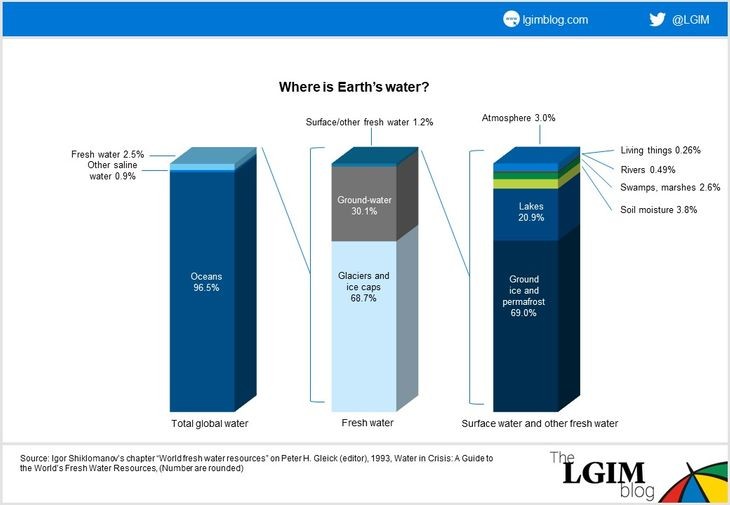Addressing water scarcity — a global issue already impacting billions of people and wreaking economic devastation – requires careful planning and cooperation. In part one of this blog we outline the risks it poses to the global population and why policymakers must respond.
It would have been impossible not to notice the very warm weather we’ve experienced recently, with record-breaking temperatures recorded in many parts of the world. In addition to causing severe problems for people and the environment, this extreme heat has highlighted another problem: water, or the lack thereof.
At LGIM, we are marking World Water Week by reflecting on the risks and costs of poor water management – and the complexities in addressing it. The health of the global water supply is a topic close to us, highlighted by our partnership with endurance swimmer and environmental campaigner Lewis Pugh, who swims in the world’s most vulnerable ecosystems to call for their protection.
Why is water scarcity a risk?
The water shortage isn’t sudden; it has compounded over many years and looks likely to continue. The UK’s Met Office has confirmed that this past July was the driest in England since 1935.[1] Nine of England’s 14 Environment Agency-demarcated areas are now confirmed to be in drought[2]. Millions in the horn of Africa are facing starvation and disease as they endure their third drought in a decade[3], the worst drought there in more than 40 years[4]. By the end of July 43% of the United States was in drought as was 47% of Europe[5], including 75% of Romania[6]. A recent report from the World Health Organization noted that two billion people have a contaminated drinking water source[7].
Put simply, water is the very essence of life on this planet. It is the most important resource for humanity, and access to it is recognised by the United Nations as a human right. Water is at the core of resilient, sustainable economic development, fundamental to achieving all of the UN’s Sustainable Development Goals.
Like energy, water permeates our lives. It impacts people, the economy, and the environment. Lack of a clean, adequate water supply poses risks to human health through disease, impact of food production, and undernutrition. Water impacts almost all economic activities and topics of critical global importance including inequality, biodiversity, involuntary migration, regional conflicts, societal and political instability.
To those of us who live in developed economies, able to access all the water we want simply by turning on a tap, it may not be obvious that water is actually a very scarce resource. While about 70% of Earth is covered by water, only 2.5% of it is fresh water, of which just 1% is easily accessible.[8]

Demand and supply
Water stress is continually exacerbated by demand-side pressures from population growth, industrial and agricultural use, and supply-side pressures from urbanisation, land-use change, aging infrastructure, pollution, depleted groundwater reserves, reliance on desalination plants, and climate change. It is estimated that by 2030 the world will face a 40% shortfall between water demand and supply[9].
This is a long-term systemic risk that has thankfully not gone unrecognised. The World Economic Forum has included ‘water crisis’ seven times in its top five ‘global risks by impact’ in the last decade. Indeed, the UK, US, and EU governments have each called out water scarcity and security in strategic reports designed to guide policymakers on long-term decision-making to confront the most-critical global challenges.
It’s clear that water scarcity risk is already having a tremendous impact across the world, and should be front and centre in the minds of policymakers. In our second blog on this topic, we discuss the actual costs of water scarcity and offer up some ideas on how policymakers may begin to address it – first and foremost, through careful planning and cooperation.
[1] UK Government, Environment Agency. Accessed 16/08/22. (https://environmentagency.blog.gov.uk/2022/08/05/environment-agency-taking-action-during-prolonged-dry-weather/)
[2] UK Government, Environment Agency. Accessed 16/08/22. (https://www.gov.uk/government/news/environment-agency-chairs-national-drought-group-as-parts-of-country-move-into-drought)
[3] World ‘at a crossroads’ as droughts increase nearly a third in a generation | | UN News, 17.05.22
[4] WEF. Ellerbeck, S. Accessed 15/08/22. (https://www.weforum.org/agenda/2022/08/drought-water-climate-un/)
[5] Guardian. Andrews, M. Accessed 17.08.22. (https://www.theguardian.com/environment/2022/aug/15/weather-tracker-drought-declared-in-england-after-driest-july-since-1935)
[6] WEF. Ellerbeck, S. Accessed 15/08/22. (https://www.weforum.org/agenda/2022/08/drought-water-climate-un/)
[7] WHO. ‘Drinking Water’. Accessed 17/08/2022. (https://www.who.int/news-room/fact-sheets/detail/drinking-water)
[8] National Geographic. ‘Freshwater Crises’. Accessed 17/08/22. (https://www.nationalgeographic.com/environment/article/freshwater-crisis)
[9] World Bank. Accessed 18/08/22. (https://www.worldbank.org/en/topic/waterresourcesmanagement#:~:text=Water%20Resources%20Management%20(WRM)%20is,support%20and%20guide%20water%20management.0

